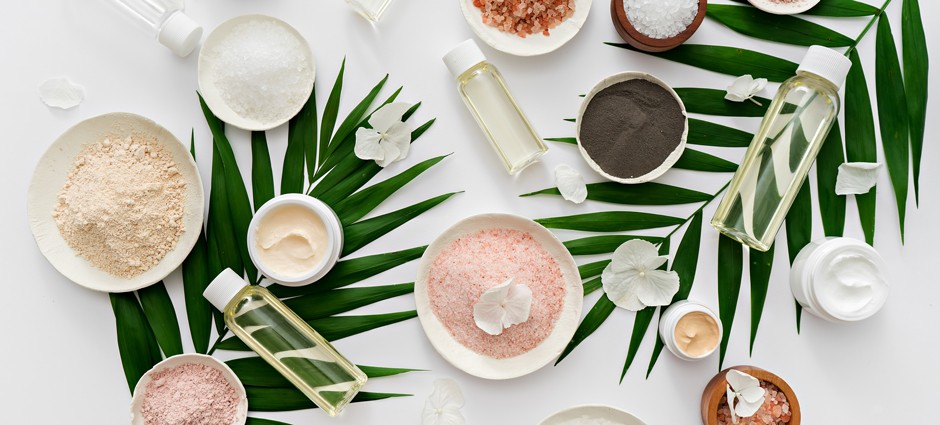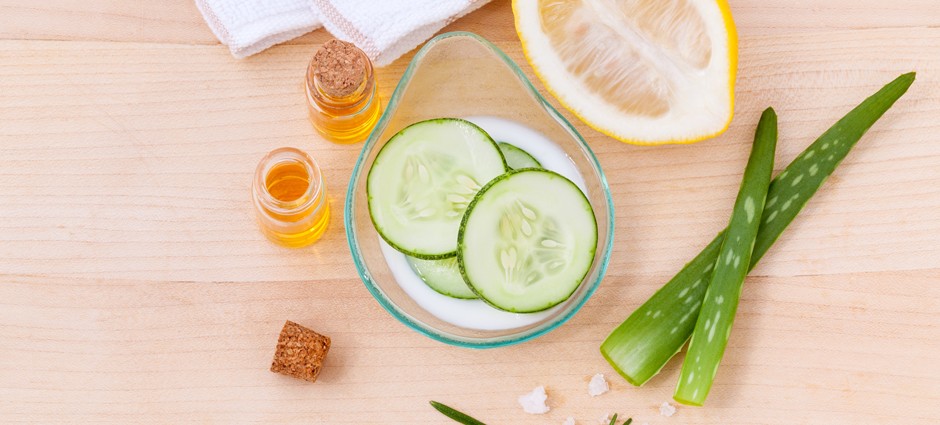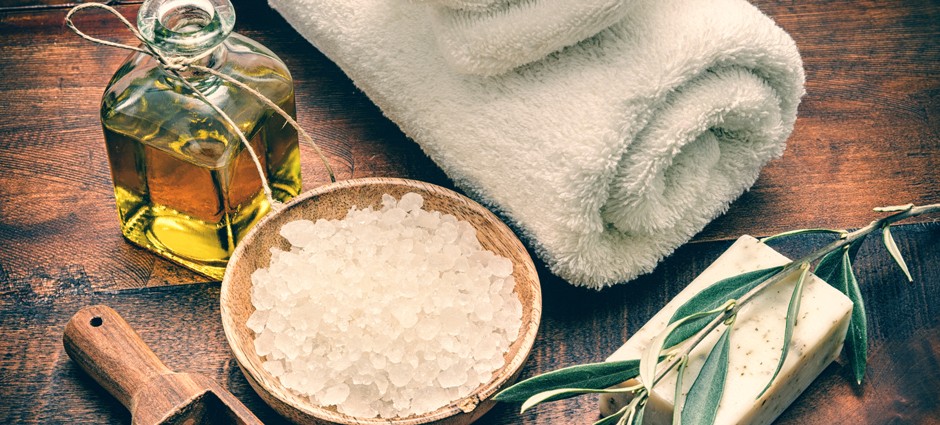Despite the high price tag on most skin-care products, maintaining healthy skin doesn’t have to be expensive. Most of the ingredients you need to nurture your skin can be found right in your kitchen cupboard, says Deborah Burnes, author of Natural Beauty Skin Care (Rockridge, 2016) and founder and CEO of Sumbody, a natural skin-care company featuring eco-friendly products.
“Ingredients matter,” Burnes says. “Not all ingredients [in skin-care products] can penetrate skin, be metabolized by skin, or are truly beneficial. Just because it costs more doesn’t necessarily mean it’s more effective. There’s a lot of power hiding in your pantry.”
Another advantage of food-based, DIY skin-care concoctions is that they’re free of toxic fragrances and other sketchy chemicals found in many store-bought products. That said, be sure you research all ingredients—even natural ones—before using them on your skin.
“Beware of DIY recipes on the Internet,” Burnes warns. “While I’m sure some are good, I’ve heard some crazy stories, like using cinnamon and cornstarch as eye shadow. Cinnamon shouldn’t be used near eyes, because it makes your skin sensitive to sunlight, and cornstarch can cause breakouts. Make sure you get your DIY recipes form a skin-care formulator.”
Food-Based Ingredients for Natural Skin Care
- Olive, avocado, grape seed, hemp, safflower, almond, coconut and apricot oils: Fatty acids and antioxidants give these oils anti-inflammatory properties.
- Avocado, banana, strawberries, cucumber, apples, grapes, orange—fresh or juiced; also citrus rind: Antioxidants in these fruits can brighten skin and improve its elasticity.
- Beer, wine, vodka and champagne: Brewer’s yeast in beer may provide antibacterial benefits when applied topically; resveratrol in wine and champagne can prevent cell damage; and vodka is an astringent.
- Cocoa powder, almond meal, arrowroot, turmeric, coconut flour, sea salt: The vinegar is an antioxidant-laden astringent, and sea salt and baking soda exfoliate.
- Apple cider vinegar and baking soda: These contain antioxidants that fight inflammation and bacteria.
- Black, green, white, rooibos and orange teas: Compounds in tea subdue inflammation and oxidization.
- Soy, almond, coconut, rice and hemp milks: These milk alternatives contain antioxidants that nourish skin.
- Honey, molasses and sugar: Honey and molasses abound in antioxidants and may encourage new-tissue growth. Sugar exfoliates and hydrates skin.
DIY Skin Care Recipes
Try whipping up your own natural skin treatments at home with these two recipes from Deborah Burnes.
Coconut Cleanser
Coconut is rich in essential fatty acids that are building blocks of healthy cell membranes. They also help produce the skin’s natural oil barrier, critical to keeping skin hydrated and youthful-looking. Coconut also contains vitamin C, which aids skin’s elasticity and flexibility, and copper, which prevents wrinkles, sagging skin and age spots. The flour is gently exfoliating, sloughing off dead skin cells to allow for cell renewal.
Ingredients:
- 1 teaspoon coconut flour
- 1 teaspoon shredded coconut (unsweetened)
- 1 teaspoon coconut milk
- 1/4 teaspoon coconut oil
Instructions:
- Place shredded coconut in blender, and pulse until shreds are small granules.
- Add all ingredients to blender. Pulse once or twice to mix.
- Use a dime-size amount of cleanser, and apply from the neck up using a circular motion with your ring and middle fingers. Skin should be damp when applying; you can add a few drops of water to the cleanser. Rinse with warm water; pat dry.
Cucumber-Lemon-Tea Toner
Cucumber contains vitamin C and caffeic acid, which soothe inflamed, irritated skin. Cucumber’s high water content makes it a hydration wonder. Tea plays different roles, depending on the kind: Chamomile calms inflammation and red, irritated or sensitive skin; red (rooibos) tea quells acne; and green and white teas fight wrinkles. Apple cider vinegar restores your skin’s pH balance, relieves sunburn and reduces age spots. As an antiseptic, it fights viruses, bacteria and yeast that cause acne and infection.
Ingredients:
- ¼ cup sliced cucumber
- 1 cup sliced lemon with rind
- 1 bag of chamomile, green,
- white or red (rooibos) tea
- ½ cup apple cider vinegar
- ½ cup distilled water
Instructions:
- Make tea using 1 tea bag and ½ cup boiling water. Let steep for 30 minutes. Cover, and set aside.
- Slice cucumber and lemon; place in a small jar with a lid (like a jam jar).
- Add apple cider vinegar.
- Refrigerate overnight.
- The next day, remove cucumber and lemon slices from apple cider vinegar and tea bag from the water. Add the tea to the cider, and shake well.
- Place cooled toner in a misting bottle; keep in fridge. Mist on face after washing, or apply with a cotton ball.
Custom-Scented Dead Sea Bath Salts
These salts are quick to make and can be done in large amounts at a time and stored for six months to a year. Olive oil makes the salts go from matte to shiny and adds moisture. Leaving it out of the recipe greatly extends shelf life.
Ingredients:
- 1 cup pure Dead Sea salt
- ½ cup Epsom salt (optional, to relieve muscle tension)
- 3 drops essential oil
- 1 teaspoon olive oil (optional)
- 1 teaspoon rose or lavender petals (optional)
Instructions:
- Pour salt(s) into a large bowl; use any combination of Dead Sea and Epsom salts you choose.
- If using olive oil, mix essential oils with olive oil first; then add to salts. Mix by hand or with a spoon or fork.
- Sprinkle in flower petals.
- Pour salts into a clean jar with a lid, and keep closed until ready to use. Essential oils lose their scent over time if not in closed glass or a PET plastic jar.
- Use 2 or more tablespoons per bath.
 Kellee Katagi is one of those strange souls who actually enjoys working out for the sake of working out. She’s spent most of her 20-plus-year writing and editing career covering fitness, nutrition and travel, as well as outdoor sports ranging from skiing to spelunking to street luge (yes, that’s a thing).
Kellee Katagi is one of those strange souls who actually enjoys working out for the sake of working out. She’s spent most of her 20-plus-year writing and editing career covering fitness, nutrition and travel, as well as outdoor sports ranging from skiing to spelunking to street luge (yes, that’s a thing).




